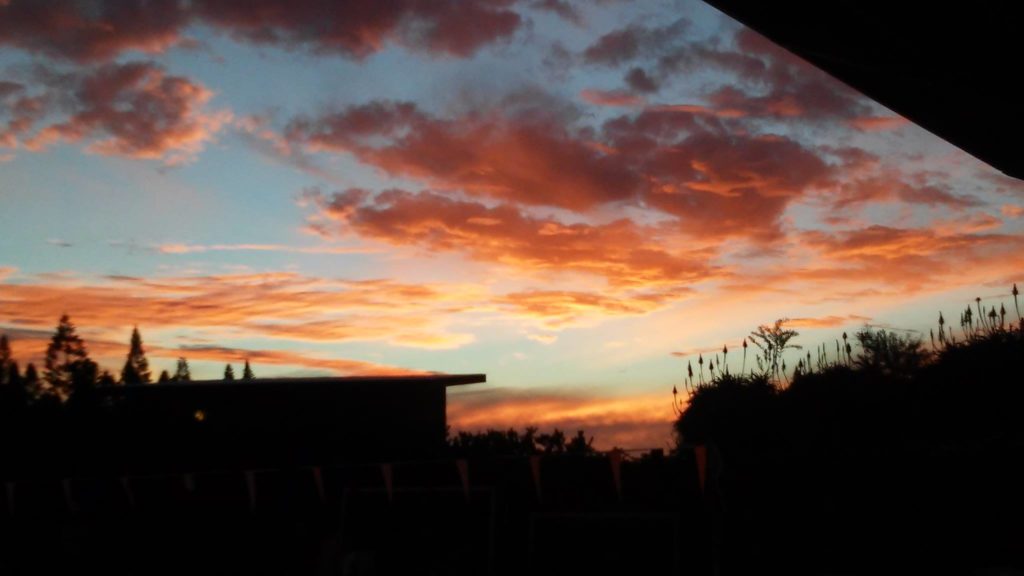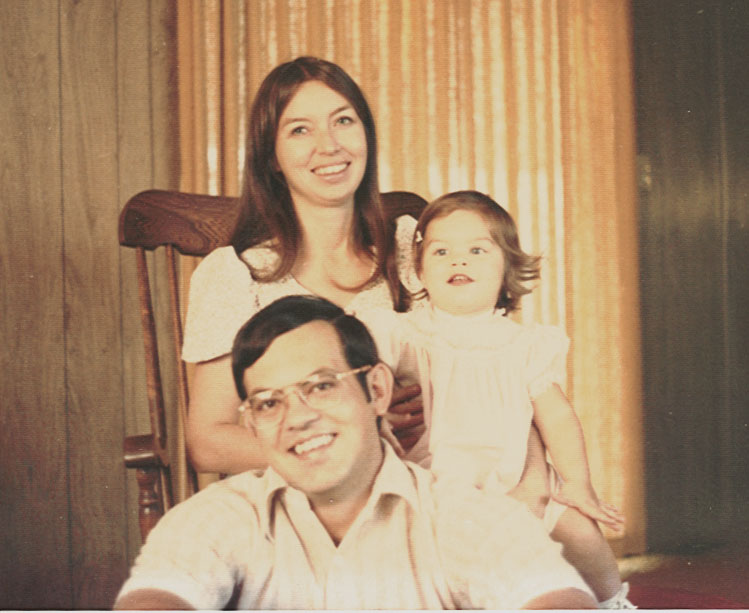The ceramic pelican soap dispenser is in the wrong place. When my parents lived in California, it was in the hall bathroom, along with the watercolor paintings of the central coast, and terra-cotta paint on the walls. Now I find it at the kitchen sink, as I overlook the nascent hibiscus hedge that my mother has planted along their new house, in Hawaii.
The painting over their fireplace is right, that was over the fireplace too. The red stools on the lanai used to be at the bar in the kitchen. The bookshelf doesn’t exist anymore that held the small “El Camino Real” bell that we have had (it seems to me) since we first moved to California in the late 70s.
The tools in the garage are still in the huge red tool cabinet, but no longer next to my father’s tool bench, or backed by the pegboard where the tools that wouldn’t fit in the cabinet went. My mom has gotten rid of a lot of the tools, she didn’t know what some of them did, and at this point it’s coming on at least a couple of years since my father has used them.
My father has his own bed, one that we can raise and lower to help get him in and out, into his chair, which is not the one he used to sit in. He used to sit in a leather easy chair, one of those vaguely Scandinavian looking ones with a footstool and a curved back. The chair is still there, in his room, but now my mom sits in it while she waits for him to fall asleep, while watching something soothing or occasionally football.
The chair he sits in now is a wheelchair, we have to use a lift to get him in and out of it. We have to move him from room to room because his arms are stiff and not-strong and his legs cannot hold him up. This is different.
My father’s voice was vigorous and for some reason I am especially remembering his sneeze. It would thunder in from the other room, my mom would occasionally ask “Are you going to live?” at the noise. He talked and cheered and shouted at football games. He would wear his LSU hoodie, or t-shirt.
He has three “Geaux” shirts now, Mom realized the other day. She didn’t remember getting him a third one but there it was on the shelf, in the closet with the hanging bags that used to be in the master bedroom in California. He wore it on Sunday, and the Tigers had the good grace to beat Georgia, but it was only my mom’s voice I heard cheering when the quarterback faked the other team out for a long run downfield, and got a touchdown on the next play.
My father’s voice now is an eerie vocalization that we can’t tell the meaning of but we can guess. He might be worried about sudden movement, a noise that startles him. He might want a drink, or not want the medicine we are trying to give him. He might want the music on, or want it to turn off. He might be trying to say something, but we have no idea what, and he might be frustrated at not being able to communicate anymore, my amazing vibrant vocal father, and so he makes that noise because it’s all he’s got left he can say,
My mother loves the ocean, and now she can drive to it within 15 minutes at the very most, but she mostly goes without Daddy these days because it’s so difficult to get him in the car (and she certainly can’t do it alone). And she goes to the coast, or to a rain forest, or to a botanical garden, and can sometimes talk about the time she was there with him, but increasingly it’s about how it would be nice to bring him, but not being sure if it’s possible anymore.
My parents traveled together it was one of the things they did and loved, Daddy drove and Mom drove and they saw friends and relatives and scenery and always each other. They still see each other. Daddy looks for Mom when she’s not there, he has a hard time going to sleep if she hasn’t checked on him, or isn’t sitting there while he drifts off. And she sees him, she looks at him and holds his gaze and tells him he is okay.
One of the last times I remember Daddy said a full sentence to me, we were sitting in a UPS store, not quite two years ago. We were working on getting some signatures on some of the documents that my parents needed so they could move, they had a window of opportunity, when they could sell their house, buy another one, and get one-way tickets to live closer to my brother and his family, before Daddy lost any more function. I was in California to hold hands, pour wine, listen, recruit high school friends to clean out the garage, and to reassure my mom that she was not doing anything wrong, whatever she decided was just fine. We were waiting, in the UPS store, and I looked at my dad, and into his eyes. He was looking so intently at me. I started thinking about everything I felt about him, his illness, the way we were losing him, how much I already missed him. I held his gaze, and thought about how brown his eyes are, and how my mom always said he didn’t like his brown eyes (he called her “Blue Eyes” and would smile his love to her). I wondered what he was thinking. And then he said to me, very carefully:
“Your eyes are red.”
My eyes are red. I miss my father. He is right here, right there in the other room in his house in Hawaii, in the the room with the photos that used to be in the house in California. He is not drinking coffee, he is not upset at the news, he is not teasing me, he is not kissing his wife. This is different.

